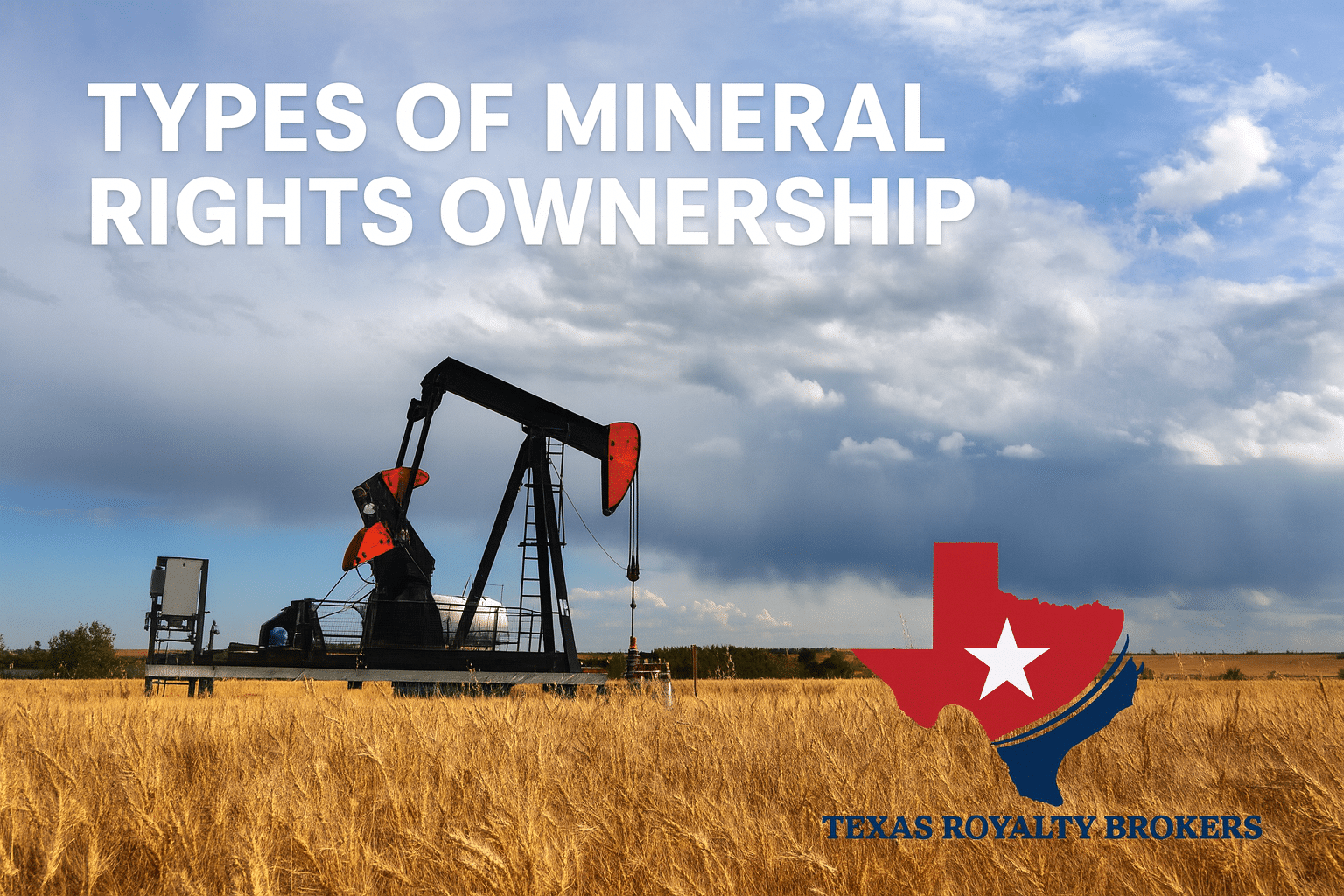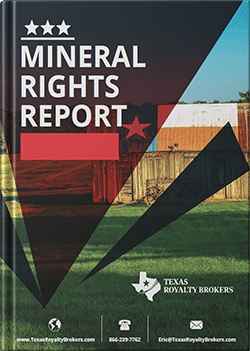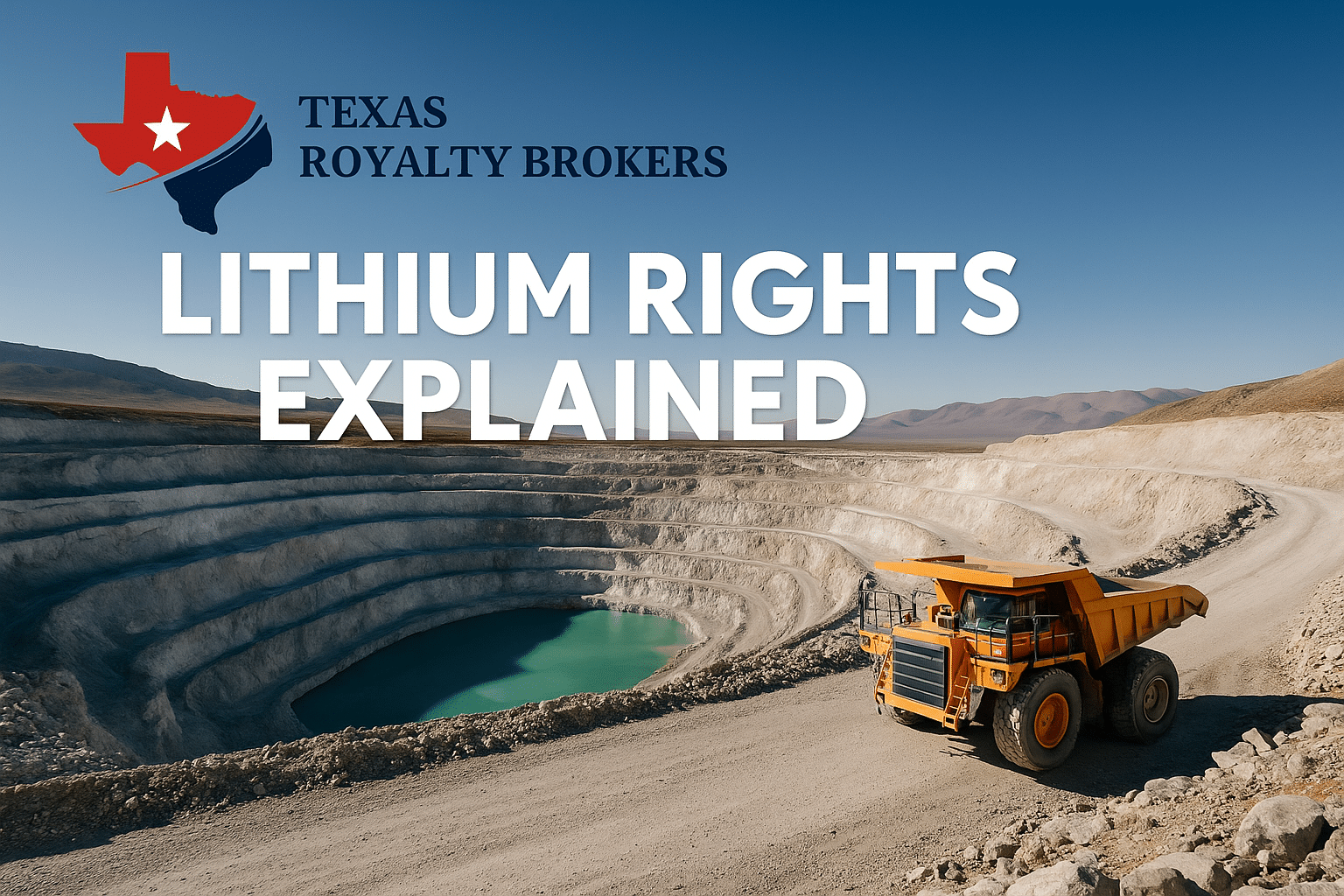Why Texas Royalty Brokers?
sellers
Buyers
State Specific Guides
Resources
Types of Mineral Rights Ownership
There are many different types of mineral rights ownership. You might own oil and gas mineral rights, timber rights, lithium, and many other types. While all of these are considered “mineral rights” they are all very different. The value of oil and gas mineral rights will be very different from timber rights.
Use the links below to skip to specific topics related to mineral rights ownership.
What are Subsurface Mineral Rights?
What are Mining Rights?
What are Surface Rights?
What are Helium Rights?
What are Co2 Rights?
What are Lithium Rights?
Real Estate and Mineral Rights
Buying and Selling Mineral Rights
What are Subsurface Mineral Rights?
Owning mineral rights means that you own the actual physical oil and gas under the ground. Mineral rights are a type of subsurface rights.
When the term “mineral rights” is used, it nearly always refers to oil and gas mineral rights ownership. However, there are other types of subsurface rights you could own. Subsurface rights are any ownership of material that is not visible on the surface of land. This means that ownership of rock, coal, lithium, and many other materials are considered subsurface rights. These materials are also mineral rights!
In most cases, “mineral rights” are understood to be oil and gas related. When other types of subsurface ownership are referenced, those are commonly called “mining rights”.
What are Mining Rights?
Outside of oil and gas mineral rights, there are many other types of mineral rights that can be mined. Here are some examples of other types of mineral rights that can be mined that are not oil and gas related:
- coal
- metal ores
- stones
- sands
- salts
- gravel
- clay
- gemstones
- limestone
- chalk
- lithium
- + many more!
When an individual or entity negotiates a contract to extract mineral rights that are not oil and gas, this is called a mining claim. When an individual or entity negotiates a contract to extract oil and gas, this is called a mineral rights lease. A mining claim or mineral rights lease gives the owner of that claim or lease the ability to extract the mineral rights whether those be oil and gas or other materials.
What are Surface Rights?
It’s important to understand the difference between surface rights and mineral rights.
When you own the surface rights, this means you own the actual land. In Texas, it is common for the mineral rights owner and the surface owner to be two different people! This is what happens when mineral rights are severed from the surface ownership.
As a surface rights owner, there are certain benefits you can get from oil and gas production even if you don’t own the oil and gas mineral rights. These include:
- Surface Damages: Let’s say that an oil and gas operator needs to drill a well on your land. They will pay you surface damages to compensate you for the land that was disrupted and changed during the process of drilling the well. These surface damage payments are negotiable. It depends on how much your land was impacted and how you negotiate with the operator to be compensated.
- Easement: Let’s say that an oil and gas operator needs to drill a well near your land. They need access across your land. To build a road across your land, they may pay you for an easement that gives them the right to build a road on your land and then use that road in perpetuity.
- Free Natural Gas: Some savvy land owners have negotiated for a natural gas line to be directly hooked up to their house / property when a gas well is drilled on their property. This would give you free natural gas for decades at your home!
- Timber: While not oil and gas related, if you own the land you have Timber rights. This means you can sell the Timber on your land to a company who cuts timber. Note: Timber rights can also be separated from the surface, but this is uncommon.
Important: Many surface rights owners are concerned that not owning the mineral rights means they have no say in what and oil and gas operator does on their land. This is NOT TRUE! As the surface owner, you have a right to negotiate what happens on your land or prevent any wells or access on your land if you wish. The operator will work around you as there is ultimately someone willing to offer the use of their land for the right price if you do not want your land disrupted in any way.
What are Helium Rights?
Helium is a valuable mineral that’s often overlooked by mineral rights owners. While most people think of helium in balloons, it’s actually a critical resource used in high-tech industries like healthcare, aerospace, and electronics. In some areas of Texas and nearby states, helium is extracted alongside natural gas, making it part of a mineral rights portfolio.
If helium is present on your property, it’s important to understand how those rights are defined in your deed. Just like oil and gas, helium can be leased or sold. At Texas Royalty Brokers, we can help you determine if your mineral rights include helium and what they might be worth in today’s market.
What are CO2 Rights?
CO2 rights are becoming increasingly important due to their use in enhanced oil recovery (EOR) operations. CO2 can be injected into older wells to increase pressure and improve oil production. Some areas in Texas have naturally occurring CO2 reservoirs, and the rights to this resource can be bought, sold, or leased just like other minerals.
You might see a line item on your oil and gas royalty statement for CO2 production.
If you’re in a region where CO2 production is viable, these rights could represent additional value. We help mineral owners understand how CO2 rights fit into the bigger picture of their holdings and how to maximize value when selling mineral rights.
Lithium Rights Explained
With the rapid growth of electric vehicles and battery storage, lithium has become one of the most sought-after minerals in the world.
While most U.S. lithium production is still concentrated in western states, exploration in brine-rich areas of Texas is gaining attention. If lithium is found on your land, the rights could hold significant long-term potential.
Understanding whether your mineral rights include lithium—and how those rights are handled under Texas law—is critical. Our team at Texas Royalty Brokers can review your situation if lithium rights are part of your portfolio.
Buying real estate without mineral rights
In Texas, it is very common to buy real estate that does not include the mineral rights.
This is because oil and gas mineral rights are well known in the state of Texas and sellers typically retain their mineral rights. Over the years, as individuals have sold their land or real estate, they have retained the mineral rights when they sell. In addition, savvy developers will purchase land and then deed the parcels off without the mineral rights. In this way, many sellers retain the mineral rights when they sell real estate or land.
When mineral rights ownership is separated from the surface, this is known as severed mineral rights. Severed mineral rights become a new ownership that can be bought or sold separate from the surface.
Buying land without mineral rights
Is it ok to buy land that does not include the mineral rights? Yes! As a surface owner, you will still benefit from some of the situations we described above if they do drill for oil and gas in your area. There is little to no downside in buying land without mineral rights. You simply need to understand what rights you do and don’t have.
Buying a home without mineral rights
Should you buy a home without mineral rights? Yes! There is nothing wrong with not owning the mineral rights related to your home. This is especially true if you are in a typical neighborhood. You will never notice the difference. The only thing you won’t get is royalty income if they extract oil and gas from beneath your home. Not owning the mineral rights does not negatively effect the value of your home. If your home came with mineral rights, it would be worth more than the market value of the house itself as the mineral rights have their own value.
Should I retain mineral rights when I sell?
It depends. There is a value to your land / house, and there is a value to mineral rights. As a general rule of thumb, the person who wants to purchase your land / home will pay less for mineral rights than they are worth. On the flip side, the person who wants to buy your mineral rights will pay less for your land / home than they are worth. You should attempt to retain your mineral rights when you sell land or a home, and then sell the mineral rights in a separate transaction.
The only exception is if you are in an area that is not productive for oil and gas. In this case, someone may pay you a premium for the mineral rights which have little to no value. Contact us for a free consultation to find out if selling your mineral rights with your land / home makes sense or if retaining the mineral rights and selling separately makes more sense.
Buying and Selling Mineral Rights
If you own oil and gas mineral rights, and you are interested in selling, Texas Royalty Brokers can help. When you sell oil and gas mineral rights it is extremely important to get competitive bids. Competitive bids from qualified buyers ensures that you sell for the highest market price available. Many mineral rights owners sell far below market value because they don’t get competitive bids.
Learn more about Texas Royalty Brokers and how to sell mineral rights for the absolute highest price. Contact us for a free consultation.
Mineral Rights for Sale
If you are interested in mineral rights for sale, check out our available listings. Our company focuses exclusively on high value mineral rights in the state of Texas. Check back often as we are constantly adding new listings.
Questions about mineral rights?
If you have questions about your mineral rights, contact us using the form below. Our team will quickly help answer your questions. There is no obligation and no pressure!






